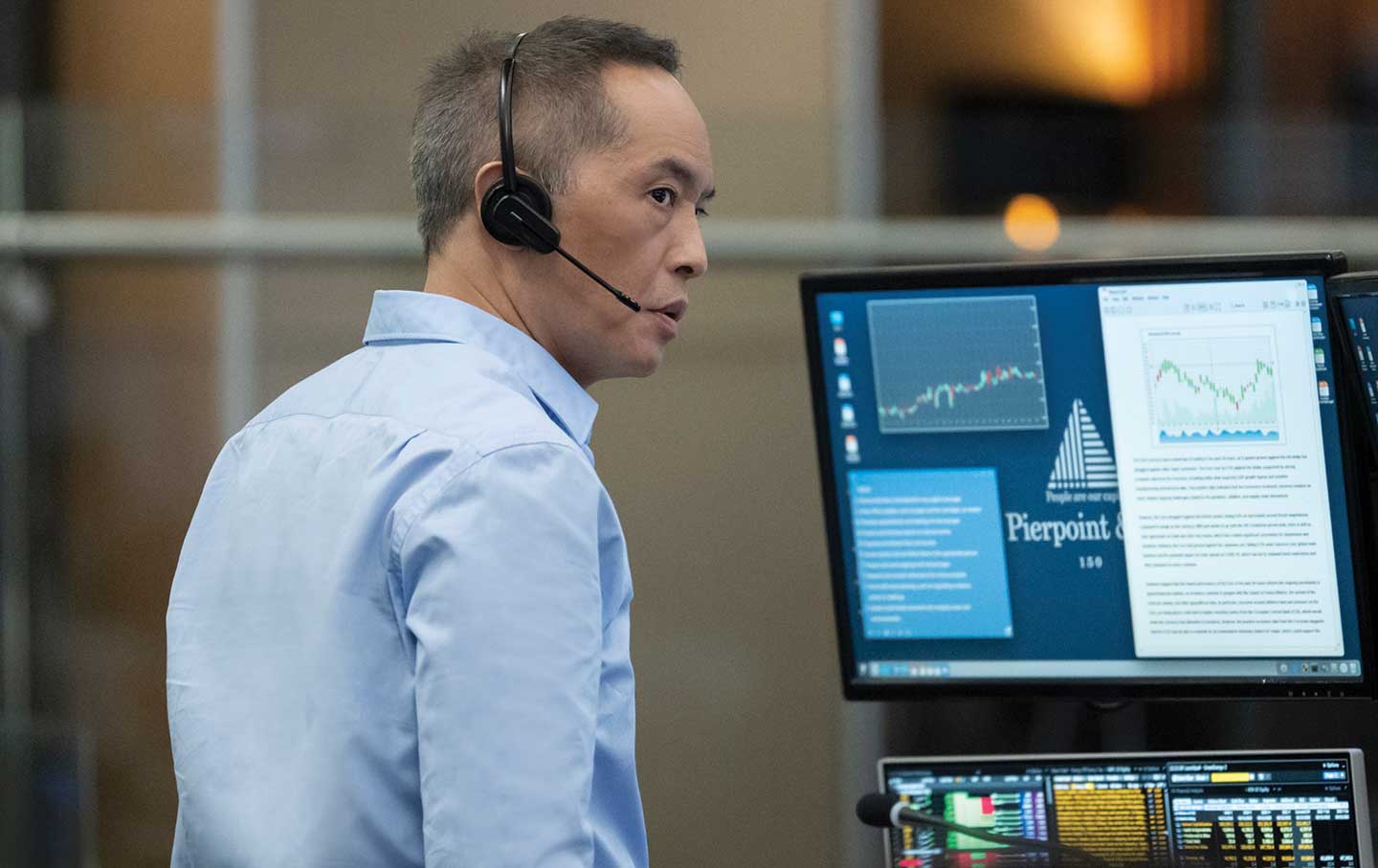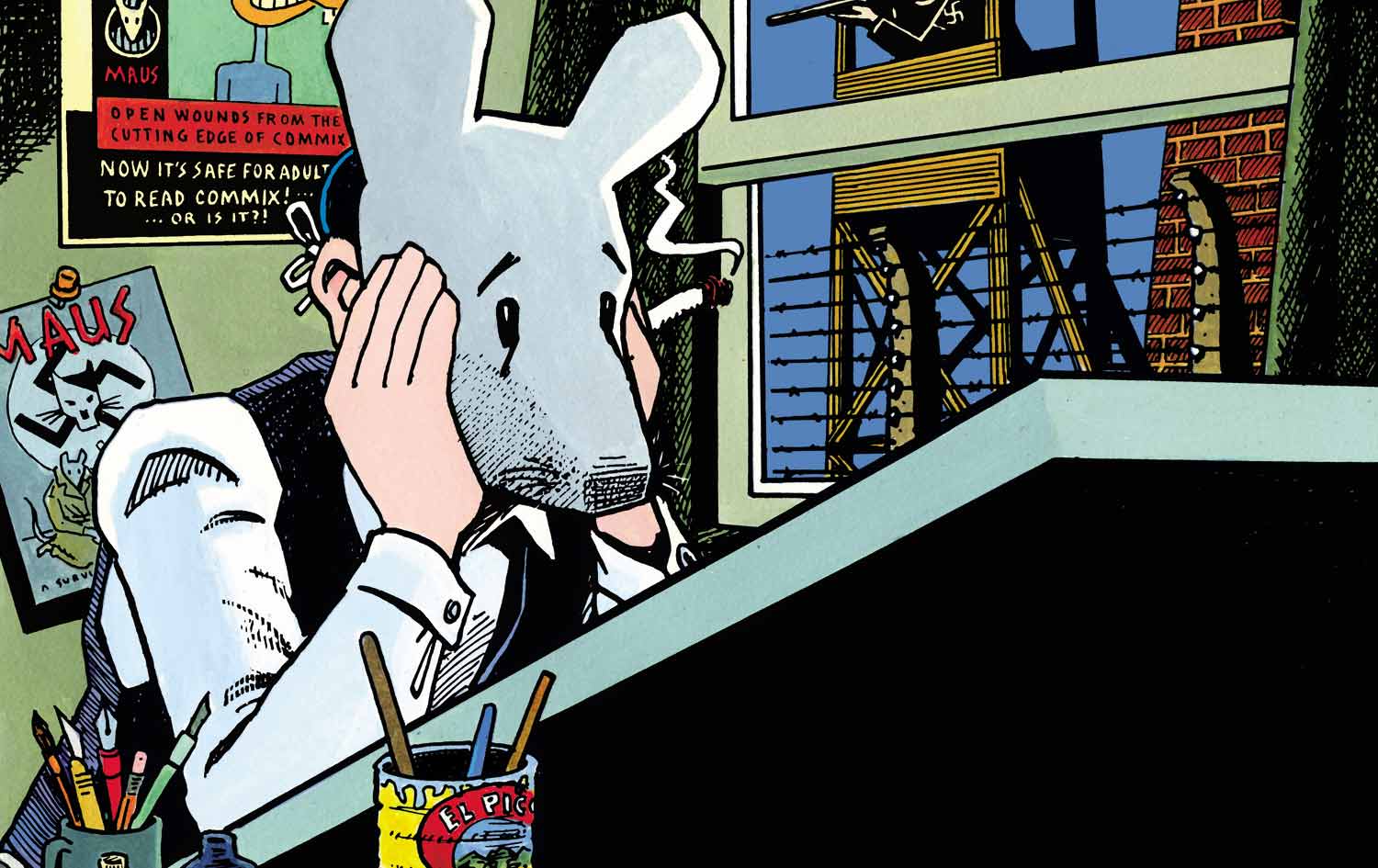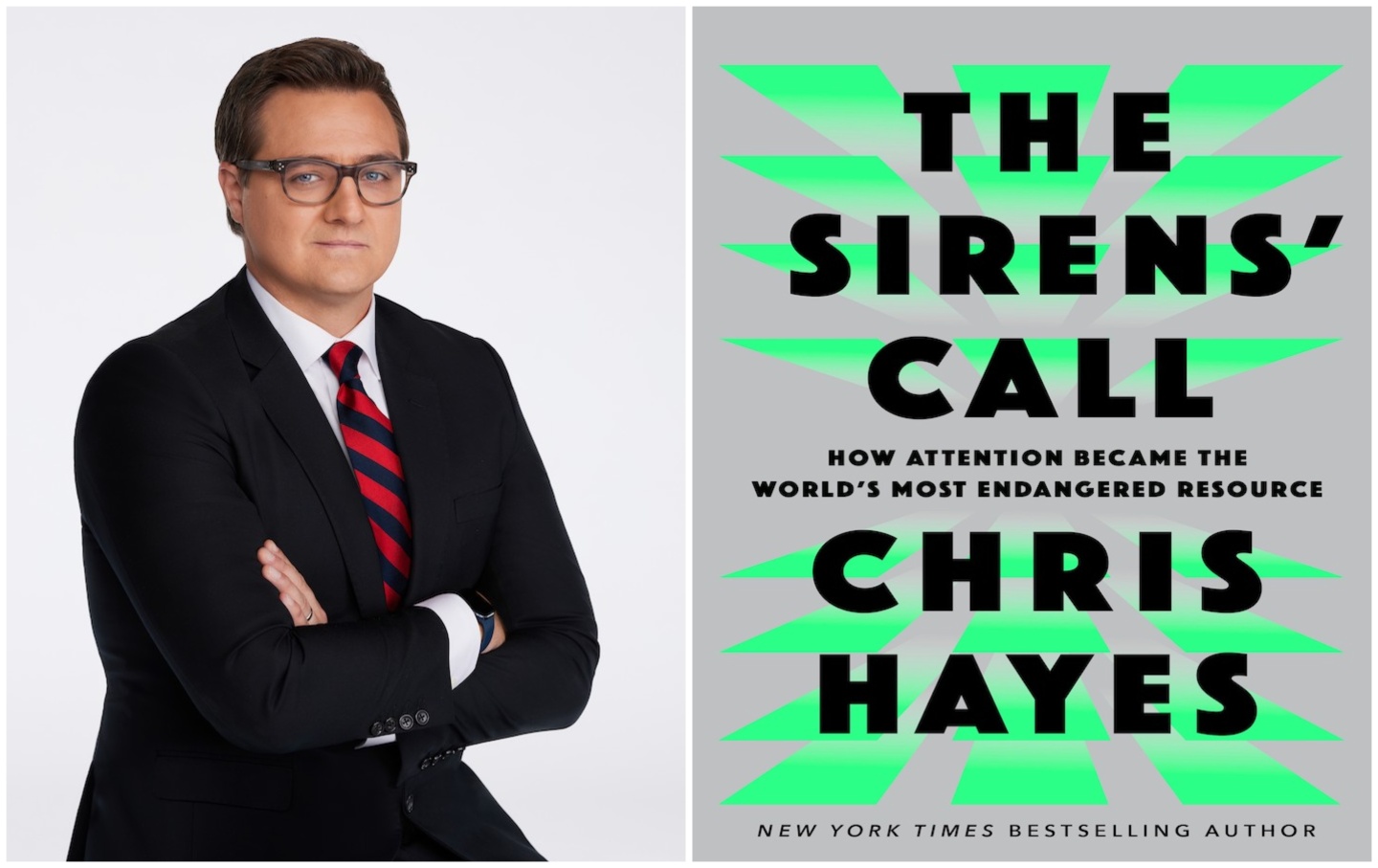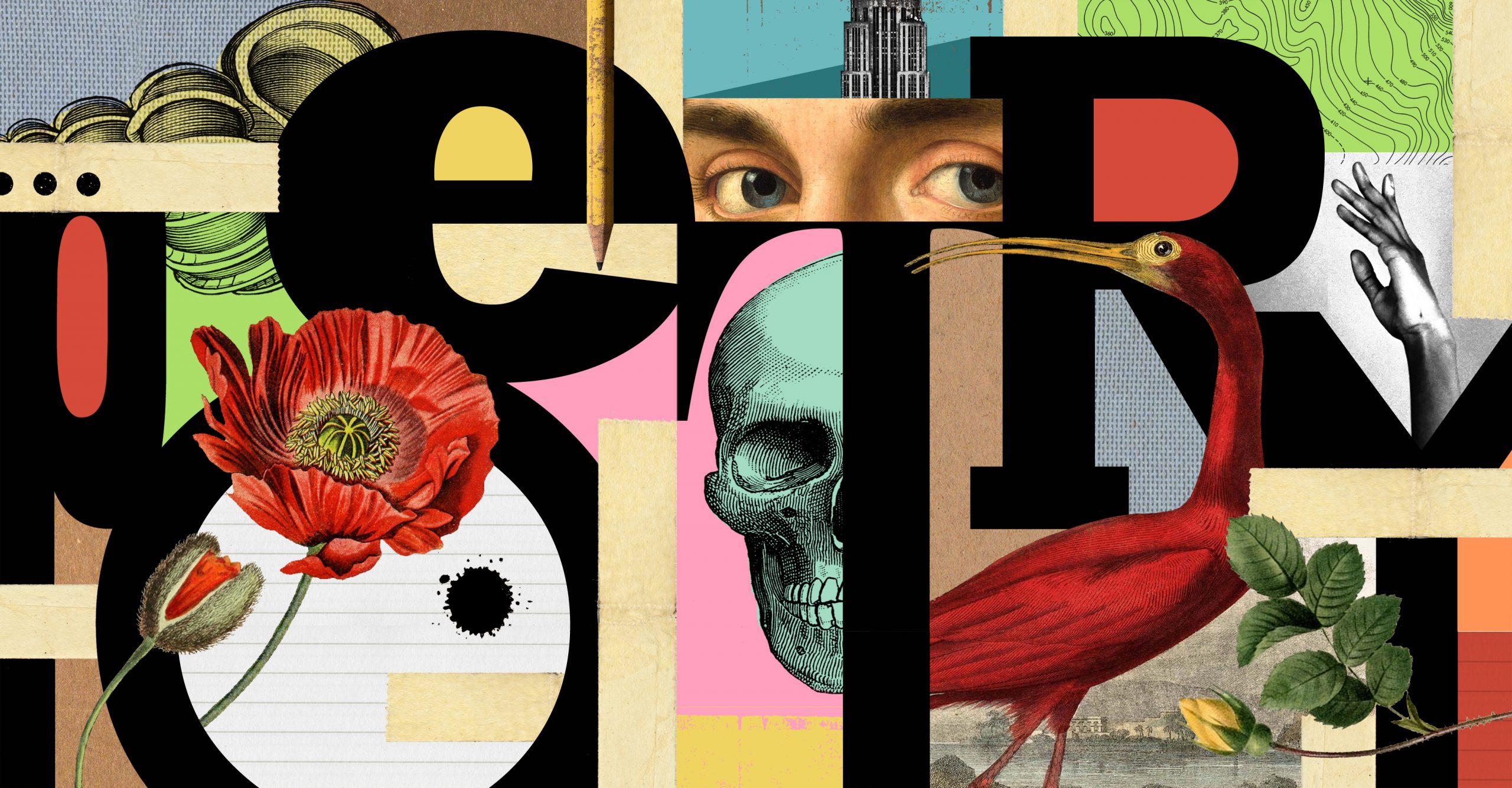Bad Investments
HBO’s investment banking soap opera.
“Industry”’s Gleeful Critique of Capital
HBO’s investment banking drama makes a soap opera out of the “useless” but lurid nature of finance.

Ken Leung in Industry.
(Courtesy of HBO)
Like many real-life office workers, the characters of Industry take refuge in the bathroom. The cold comforts of the toilet are often the de facto hideaway for the London-based employees of the investment bank Pierpoint & Co. A place for gossip or escape more so than micturition, the facilities are also a hotbed of illicit activity, per the customary recklessness fostered in a stressful profit-making environment. In the series’ pilot, a young, inexperienced banker dies alone, slumped on the floor of a stall, after suffering a heart attack brought on by sleep deprivation and stimulant use. Life and death (literal and spiritual) occur in the restroom, if for no other reason than it’s a sanctuary from the cutthroat trading floor, where vulnerability can be bought and sold just as easily as holdings in a portfolio.
If that description sounds melodramatic, it might be because Industry is melodramatic. The show’s first season followed a group of recent college graduates whose entry-level positions were predicated on demonstrating their value to the company over the next six months, lest they face redundancy. Though Industry sports a large ensemble cast, most of whom drop in and out of the narrative like employees in a workplace with a high turnover rate, only three from the initial group of recruits sustain a consistent focus across the series: Harper (Myha’la), a college dropout from New York; Yasmin (Marisa Abela), a well-connected London publishing heiress; and Robert (Harry Lawtey), the son of an Oxford bartender. Each one carries their own set of demons and harbors a complicated relationship with professional ambition and material gain.
Eric (Ken Leung), a middle-aged managing director with a penchant for cruel pep talks, serves as the elder foil to the show’s young-adult crew. He is equal parts mentor and tyrant, first with Harper, with whom he shares the closest and most fraught relationship, and then with Yasmin and Robert in the latest season. His tendency to stoke the venal elements in a person’s character under the guise of motivation frequently clashes with his need to control his pupils. Once a powerhouse, Eric finds in Industry’s latest season that his influence has considerably dwindled in proportion to Pierpoint’s own diminished clout and respectability. After ousting Harper from the company, he muddles his way through a boozy midlife crisis fueled by a separation from his wife, just as the bank he has given his life to faces a solvency crisis.
The former grads remain in or near Eric’s orbit, but they are also forced to deal with problems of their own. Harper allies with the callous Petra (Sarah Goldberg) to start a hedge fund whose strategy is based on the assumption that ESG (environmental, social, and governance) investments, a cornerstone of Pierpoint’s portfolio, are a fad. Meanwhile, Yasmin has to deal with the media fallout and financial consequences stemming from her missing father’s embezzlement activities and his record of sexual impropriety. Robert, an eminently pitiable working-class striver, pulls himself out of a downward spiral and undergoes a transformation of his own: He becomes disenchanted with his work after being assigned to shadow Sir Henry Muck (Kit Harrington), the obnoxious chief executive of Lumi, a green-tech energy company whose IPO is being handled by Pierpoint.
“I think there are people, circumstances, and opportunity. That’s it,” Harper says to Petra, spelling out Industry’s view of the borderline sociopathy that the financial sector nurtures. This unsparing credo is almost unnecessary: Industry’s creators, Mickey Down and Konrad Kay, both former bankers, have spent much of the show’s three seasons detailing the mercenary sensibility needed to succeed in high finance. Despite all the drama of the characters’ personal lives—the people they fuck, the drugs they do, the friends they lean on—the show’s premise is quite simple: a gleeful take on what John Lanchester has called the “useless” nature of finance, a business whose sole purpose is not a “useful” exchange of labor but a speculative enterprise based on the movement of numbers. The soapy operatics serve this simplistic critique of capital, one that flattens race and class until only the profit motive remains. It’s a valid if deterministic worldview that can obscure as much as it reveals.
Industry’s first season admirably threw viewers into the deep end of its rarefied world by refusing to provide expository information; it simply expected you to figure out the financial jargon through context. Down and Kay overcompensated for any potential inscrutability by magnifying the characters’ after-hours recreational drug use and sex lives, a flashy and frankly unnecessary narrative strategy to retain viewers’ attention.
The series ultimately found an effective balance between its risqué and buttoned-down sides by widening its scope beyond the ins and outs of the trading-room floor. While the first season tackled Pierpoint’s toxic office culture, the second focused on how the firm intersected with a global economy grappling with the long-term consequences of inequality. Set in the immediate, return-to-office aftermath of Covid, the series’ sophomore year follows Pierpoint’s dealings with an Internet healthcare company and a billionaire American hedge fund manager who profited off the pandemic. Industry used these elements to examine the meme-stock phenomenon, the viability of private healthcare in the UK, and the shallowness of social consciousness among the wealthy.
In its third season, Industry followed up on that final point by illustrating how investors and CEOs use progressive rhetoric to conceal their fundamental greed. The series makes no bones about its view of companies who appropriate social causes to improve their public relations, presenting the aristocratic Muck and the rocky IPO launch of Lumi as the epitome of how tech companies falsely claim they’re serving anyone but themselves. Harper and Eric might be narcissists who would sell out their mother for an extra dollar, but the show expresses an undeniable respect for them because they’re honest about who they are—greed embodied. Their occasional attempts to deny their avarice end in swift reminders that solidarity is a losing tactic.
Industry puts a lot of stock in characters embracing their authentic selves. Yasmin becomes more confident the moment she stops downplaying her obscenely wealthy background and leans into her rich-bitch eminence. Robert begins to achieve serenity only when he accepts that no amount of sycophancy or sexual pliability will ever make him fit in with the one percent. The show takes a contemptuous view of goodness emanating from an inorganic source—a description that covers almost everyone on-screen.
Down and Kay also offer a jaded view of how racial identity works in the corporate world. The series accurately captures the way people of color with a vested interest in ladder-climbing often adopt a bootstrapper’s mentality, even while serving those who never needed to pull themselves up. Harper, a Black American woman, and Eric, a Chinese American man, have both been on the receiving end of racism and patronization. But instead of bristling at their treatment or becoming some kind of moral crusader, they both deduce that they can ruthlessly overcome any barriers to social mobility, so that their race becomes negligible.
Harper is eminently aware of how she can trade on race to secure favorable deals with people who wish to be perceived as supporting diversity. When she and Petra successfully court a smug financier to invest in their new fund, he cheekily compliments her “progressive look.” Harper replies, “New look. Same great taste,” aligning herself with aging white reactionaries who wish to make money no matter the ethical lapses required.
Eric, on the other hand, took the brunt of open racism in the workplace as he ascended the ranks in an earlier era, specifically from his own Pierpoint mentor, who would “affectionately” refer to him using anti-Asian slurs. But he sees this mistreatment as a badge of honor, something that didn’t stymie his rise from managing director to partner. He’s also more than willing to play up his outsider position whenever it suits him, especially when it allows him to pursue insider interests. In the third season’s finale, Eric attempts to quell worries after the company is sold to the Egyptian firm Al-Mi’raj by giving his version of Gordon Gekko’s “Greed is good” speech from the movie Wall Street. He butters his listeners up with his own rags-to-riches story and insists that they’re all in the same boat, even as he knows that he’ll be firing most of them eventually.
After the speech, Eric reveals to a colleague that he stole his most affecting lines—“Money takes the beast. Money is peace. Money is civilization. The end of the story is money”—from Denis Johnson’s “Largesse of the Sea Maiden” and that he invoked his background purely for rhetorical purposes. “Thought I’d hit all the targets,” he says. “Immigrant mentality. American promise. ‘This place made me.’ Blah, blah, blah. ESG bullshit.”
In an extensive GQ profile published before the third season’s premiere, Down and Kay spoke candidly about the show’s earlier flaws, including the “naïve formlessness” of the first season. They worried about the opaque vernacular of finance and wondered whether the youthful cast lent a regrettable “YA” feeling to the series. They asserted that they’d overcorrected for these defects in the second season, infusing the show with a “dour tone” and implied that they may have too neatly tied characters’ behavioral patterns to their histories.
In their view, Industry’s third season marries the best elements of its first two. Critics and audiences certainly agree; it has become a word-of-mouth hit for HBO, and the show does exhibit a previously unseen energy in its plotting. The back half of the season successfully speedruns an entertaining banking-crisis storyline that mirrors the 2008 financial collapse; a new confidence in the writing and ensemble performances makes the series feel more lived-in than before. It casually pulls off the now-familiar prestige-TV maneuver of a single-character episode—in this case, one that follows secondary player Rishi (Sagar Radia), an aggressively vulgar, misogynistic trader—that’s both an homage to Uncut Gems and a cutting view into outdated machismo in the financial sector.
At the same time, Down and Kay’s self-assessment feels off. For one thing, the first season’s refusal to talk down to its audience about finance injected authenticity into the show; it signaled a vote of confidence in its viewers at a time when showrunners frequently underestimated them. The problem was never the legibility of the dialogue, but rather the often predictable and schematic nature of the characterizations and how they overlapped with a fairly bland critique of capitalism.
Down and Kay like to believe that their characters’ motivations and dynamics are irreducible. (People “want total resolution. But the true answer is we don’t know—and that’s why it’s good,” Kay explained to GQ.) But too often those motivations and dynamics are traced back to childhood trauma. Yasmin may wish to extricate herself from her father’s vicious legacy, but she constantly replicates his behavior. Similarly, Harper’s narcissism derives from her estranged family relations; her God complex emanates from a sincere belief in her own superiority cultivated by a belief that personal attachments are an anchor around her neck. (Laws against insider trading are for mere mortals, after all.) Harper and Yasmin are foils for each other—working-class versus rich, native citizen versus immigrant—but psychologically they both fall into a pattern that Down himself cites as corny: “Having someone’s background basically be a harbinger of how they’re going to behave…I find that to be one of the most annoying and cloying and obvious things in TV now.”
Popular
“swipe left below to view more authors”Swipe →Otherwise, greed is the determining factor for almost all of the behavior in the show. In one of the third season’s most ruthless scenes, Eric uses his friend’s illness in the cruelest and most public way imaginable because it’s a good career move; although it pays off in the short term, it ultimately leaves him a king without a kingdom. Harper exploits her friendship with Yasmin to gather privileged information and eventually gets her fired. In the end, the characters’ strife and toil always boil down to a simple axiom: Success in finance demands a rejection of emotion and, practically speaking, of moral or ethical scruples. The problem is not that Industry’s politics aren’t sound; it’s that the show hammers home the same point until it becomes stale and unremarkable. The moral race to the bottom quickly becomes monotonous because it’s not just overdetermined but all too obvious.
Industry is hardly the first series to document the cutthroat excesses of the business world—forebears like Mad Men used similar ingredients potently. But there’s often a spark missing from the proceedings that keeps Industry from greatness. Maybe it’s because the dialogue isn’t funny enough, or because the general self-destruction doesn’t cut deeply enough to be fully tragic. Don Draper’s personal and professional sins were always in tension with his rich interiority. Perhaps there’s a generational rift at play, but as entertaining as Industry can be, its characters have revealed themselves to be more superficial over time.
In Industry’s first season, the grads’ fear or frenzy felt genuine enough to be emotionally engaging simply by the virtue of their age: It was genuinely affecting to watch someone call their mom in a panic from a bathroom stall. But now that the characters have matured into adults, they seem like they’re out of surprises, at least partly because they’re in service to a fixed worldview. That could change, as Industry seems poised for a reset in its fourth season. But if the show has taught us anything, it’s that no matter where you go in the world, the laws of the trading floor remain the same.
Support independent journalism that exposes oligarchs and profiteers
Donald Trump’s cruel and chaotic second term is just getting started. In his first month back in office, Trump and his lackey Elon Musk (or is it the other way around?) have proven that nothing is safe from sacrifice at the altar of unchecked power and riches.
Only robust independent journalism can cut through the noise and offer clear-eyed reporting and analysis based on principle and conscience. That’s what The Nation has done for 160 years and that’s what we’re doing now.
Our independent journalism doesn’t allow injustice to go unnoticed or unchallenged—nor will we abandon hope for a better world. Our writers, editors, and fact-checkers are working relentlessly to keep you informed and empowered when so much of the media fails to do so out of credulity, fear, or fealty.
The Nation has seen unprecedented times before. We draw strength and guidance from our history of principled progressive journalism in times of crisis, and we are committed to continuing this legacy today.
We’re aiming to raise $25,000 during our Spring Fundraising Campaign to ensure that we have the resources to expose the oligarchs and profiteers attempting to loot our republic. Stand for bold independent journalism and donate to support The Nation today.
Onward,
Katrina vanden Heuvel
Editorial Director and Publisher, The Nation
More from The Nation

Art Spiegelman and the Inescapable Shadow of Fascism Art Spiegelman and the Inescapable Shadow of Fascism
The creator of Maus has learned that the past is always present.

Nusrat Fateh Ali Khan’s Voice From the Past Nusrat Fateh Ali Khan’s Voice From the Past
The Pakistani qawwali icon sang words written centuries ago and died decades ago. He’s got a new album out.

How the US Courts Rewrote the Rules of International Trade How the US Courts Rewrote the Rules of International Trade
Shaina Potts’s Judicial Territory examines how the American legal system created an economic environment that subordinated the entire world to domestic business interests.

The Oscars Are Upon Us The Oscars Are Upon Us
Who will win big at the biggest night in movies?

Chris Hayes Wants Your Attention Chris Hayes Wants Your Attention
The Nation spoke with the journalist about one of the the biggest problems in contemporary life—attention and its commodification—and his new book The Siren's Call.



